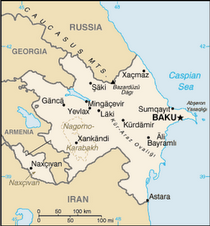Sheki doesn't have traffic jams yet thank God. But Baku, the capital, does.
I am posting today an extract from the article that my colleague Axel Reiserer wrote in our corporate newspaper about traffic jams in Baku. As you know there are different ways of looking at everything in life...:) Wishing you a cheerful start for the business week!
"The most important part of a car, you learn in Baku, is the horn. There are more ways of honking than there are ways of saying “I profusely and unreservedly apologise” in Japanese. There is a kind of honking to warn someone. There is honking to greet a friend. There is honking to yell at somebody. There is honking to threaten a hostile moving object. There is honking to scare away pedestrians (a certain class of imbeciles who, luckily, are becoming less and less frequent in Baku and whose extermination thanks to traffic accidents scientists predict by 2025.) There is honking to express joy because the road is free (rare during daytime, but very popular between 2am and 5am). There is honking to express frustration because the road is jammed (all other times). There is honking because someone is honking at you. And there is honking because someone has not honked at the right time, in the right place or in the right style. The latter is also important, because there are various techniques of honking: loudly, aggressively, tenderly, amicably, shyly, with hostility, relentlessly.
Honking is the symphony Bakintsy compose to celebrate their city every day. It all becomes a carpet of sound which has no ending and no beginning and encloses the whole city like the magic carpets in oriental fairy-tales. And surely magic is the only plausible explanation of how Baku residents manage to move their cars while being preoccupied using the horns.
But then this is the Orient after all."


 My today' post is about Sheki Halva. Halva is a sweet prepared from nuts, walnuts, butter, sugar and spices and other food stuff that I don't know. Halva is something that Sheki is very famous for. If anyone goes to Sheki he makes sure to bring at least a box of halva back with him. Halva goes very well with tea and is something that Sheki people are very proud of.
My today' post is about Sheki Halva. Halva is a sweet prepared from nuts, walnuts, butter, sugar and spices and other food stuff that I don't know. Halva is something that Sheki is very famous for. If anyone goes to Sheki he makes sure to bring at least a box of halva back with him. Halva goes very well with tea and is something that Sheki people are very proud of. 













.JPG)























 Ilisu is the village situated in Qakh region of Azerbaijan. Qakh is located in 1.5-2 hours drive from Sheki. Both regions are blessed with beautiful mountains and in Qakh mountains are even closer (I mean that people live even closer to the mountains). Ilisu village of Qakh is famous for its healing hot(warm) springs but it is not possible to drive up to them but only go on horses. We didn't go up to those springs this time but only walked up to see the waterfall. Going up is quite difficult (especially to my husband who had to carry the child up there as well) and it is a walk of around 1km...but we made it...unfortunately there was no tea house up there...going down was easier :) and we rushed to drive and find a tea house in the village...if you wish to see the photos of the tea house wait for my tomorrow's post...:)
Ilisu is the village situated in Qakh region of Azerbaijan. Qakh is located in 1.5-2 hours drive from Sheki. Both regions are blessed with beautiful mountains and in Qakh mountains are even closer (I mean that people live even closer to the mountains). Ilisu village of Qakh is famous for its healing hot(warm) springs but it is not possible to drive up to them but only go on horses. We didn't go up to those springs this time but only walked up to see the waterfall. Going up is quite difficult (especially to my husband who had to carry the child up there as well) and it is a walk of around 1km...but we made it...unfortunately there was no tea house up there...going down was easier :) and we rushed to drive and find a tea house in the village...if you wish to see the photos of the tea house wait for my tomorrow's post...:) 
